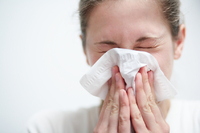Do you avoid kissing in winter to avoid infection?

New research from the Global Hygiene Council shows the UK still needs to improve hygiene habits to prevent infection during the cold and flu season.
As we get well into the cold and flu season and with the festive season fast approaching, new research from the Dettol Hygiene Home Truths study has revealed that 48% of Britons are wary of greeting someone with a kiss on the cheek if they look ill. Women are the most conscious of picking up germs from others with just over half (52%) saying they wouldn’t greet someone who looked ill with a kiss, and 35% saying they would avoid shaking hands. Keeping your distance from someone who is ill along with hand washing and targeted surface disinfection are measures which can help prevent the spread of cold and flu.
The Dettol Hygiene Home Truths study has also found that 28% of people are unconcerned with passing their germs to others by admitting to not covering their nose and mouth when sneezing.
Despite basic hand washing being the first line of defence against the spread of infection from bacteria and viruses, 40% of 16-24 year olds admitted to not washing their hands after going to the toilet. This can lead to potentially harmful bacteria cross contaminating surfaces such as door handles and work tops in the home, as well as from person to person and highlights the lack of understanding around the spread of infection.
It is not all bad news for the younger generation; results suggest that 16-25 year olds are more conscious of germs and bacteria than previously thought as the results highlighted that 16-25 year olds are almost twice (42%) as likely as those over 55 (23%) to avoid shaking hands with someone that looks ill.
Professor John Oxford, Chairman of the Global Hygiene Council and Professor of Virology at Barts and The London School of Dentistry commented, “We want people to recognise that infections are often transferred via contaminated hands and surfaces. Social distancing, hand washing with antibacterial soap and surface disinfection can help break the chain of infection.”
Infections are often picked up at home and the kitchen is a known breeding ground for bacteria; however over half (55%) of respondents admitted to having used a dish cloth for longer than they should and over a third (35%) of people have used a dish cloth on several surfaces without washing it in between. The importance of these findings are supported by results from the Dettol Survival Study which found that harmful bacteria can survive on household surfaces, including dish cloths, for up to 48 hours.
Professor Oxford comments, “These scientific studies show that bacteria can survive for extended periods on household surfaces and can be readily transferred to cleaning cloths. If not handled carefully there is the potential for damp kitchen cloths to become a reservoir for germs spreading them all around the kitchen. Targeted disinfection that kills harmful bacteria is essential in helping to keep you and your family healthy.”
The Dettol Survival Study also found that bacteria such as E. coli, Campylobacter, Listeria and Salmonella all survived on average two or three times longer on a damp cloth than they did on a dry cloth.
For further information, visit hygienecouncil.com.

